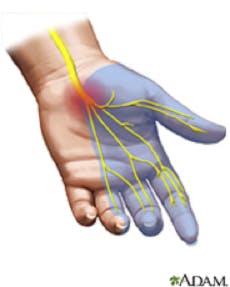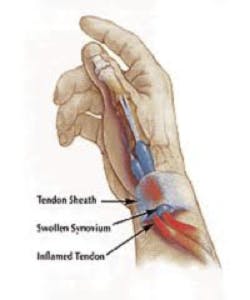By: Michael Miller, SPT and Richard DeFalco, DPT, OCS, CSCS, CWcHP, Cert. DN
The hand and wrist are the most active and intricate parts of the upper extremity. Due to the high levels of demand they are vulnerable to injury, which may ultimately lead to functional difficulties involving fine motor skills of the hands. A repetitive strain injury may be at play, which is an "overuse" syndrome that results from excessive use of the hands to perform a repetitive task, such as typing, writing, or clicking a mouse. Over time these injuries may become chronic which may affect job tasks and daily household activities. The two most common repetitive strain injuries of the hand and wrist are Carpal Tunnel Syndrome and De Quervain Tenosynovitis.

Carpal Tunnel Syndrome (CTS)
CTS is the most common peripheral neuropathy affecting about 1% of the general population. It most commonly occurs during middle and advanced age and affects women twice as frequently as men. The syndrome is characterized by pain, numbness, or tingling in the palm of your hand and typically favors the thumb, index, and middle fingers. The reason for this pain pattern is because the median nerve travels through the carpal tunnel and has nerve endings that supply this area of the hand, and if compressed symptoms will arise. Reasons for compression include fluid retention, infection, or excessive use of the fingers causing swelling of the tendons. Pain and tingling at night is also very common as well as other activities such as typing on a computer, buttoning up a shirt, or holding a coffee cup. This pain and tingling is sometimes relieved if you massage or shake your hand quickly. If early signs of CTS are not treated, weakness may develop over time and grip strength will diminish.

De Quervain Tenosynovitis
This disorder is the most common overuse injury involving the wrist. A case series suggested that De Quervain tenosynovitis affect women up to 6 times more than men and is associated with the dominant hand during middle age. Each of the muscle tendons that cross the wrist are surrounded by a synovial sheath that helps glide the tendons during wrist and hand movements. The muscle tendons on the thumb side of the wrist (abductor pollicis longus and extensor pollicis brevis) share a common sheath. If these muscle tendons are over-used, friction will occur between these two tendons causing tendon sheath thickening and inflammation. Pain, tenderness, and swelling on the thumb side of the wrist is a common presentation. Individuals who regularly use a forceful grip coupled with a downward motion of the wrist (ulnar deviation) may be prone to having this condition. Activities including turning doorknobs, jar lids, or screw drivers may increase the pain.
Ignoring these two conditions may lead to chronic problems down the road, which will ultimately affect everyday activities including dressing, gripping, writing, and other daily functional activities. If caught early, activity modification, splint use, and prescriptive therapeutic exercises and modalities are conservative ways to manage these two conditions. Chronic or severe cases of CTS or De Quervain Tenosynovitis may require corticosteroid injections or surgical decompression to allow the muscle tendons to glide freely.
These two conditions along with other wrist pathologies are treated by the experts here at Professional Rehabilitation Services. At Professional Rehabilitation Services we pride ourselves in distinction, and one of our Board Certified Orthopedic Physical Therapists will pursue an individualized treatment approach to your needs. Less than 5% of physical therapists in South Carolina are board certified in orthopedics. All physical therapists at Professional Rehabilitation Services are board certified. So if you or someone you know is having hand and/or wrist pain or another musculoskeletal pain, seek the consultation of a physical therapist at one of our three locations, or see your physician for a referral to one of our facilities.
At Professional Rehabilitation Services, we treat a wide variety of neuromusculoskeletal conditions using the latest in evidence based therapies provided by highly credentialed physical therapists. In addition to being licensed physical therapists, our providers have additional specialty certifications and training in orthopedics, manual therapy, sports, strength and conditioning, vestibular treatment, and dry needling. For further information on these wrist injuries or other related topics please contact Richard DeFalco, DPT, OCS, CSCS, CWcHP, Cert. DN at Professional Rehabilitation Services (Myrtle Beach) (843) 839-1300, Brian Kinmartin, PT, DPT, MTC, OCS, STC, CWcHP, Cert. DN (Pawleys Island) (843) 235-0200, or Richard A. Owens, PT, MS, OCS, Cert. SHT, CWcHP, Cert DN (Surfside) (843) 831-0163, or visit our website at www.prsrehabservices.com where you can learn more about the company and even download a referral form for your physician to fill out.
